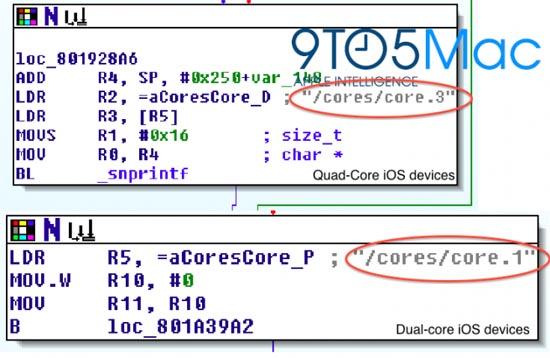
The code used within new versions of Apple's iOS has revealed some interesting tidbits of information in the past, like most recently when references to a new iPhone model 5,1 were discovered in the iOS 5.1 beta code, and today that trend continues. After digging through the latest beta version of iOS 5.1, 9to5Mac discovered a reference that reads "/cores/core.3," which it claims indicates that support for quad-core processors is being baked in to the OS. The site explains that a "/cores/core.0" reference is an indication of single-core processor like the one found in the iPhone 4 and iPad, while "/cores/core.1" points toward a dual-core CPU like what's present in the iPhone 4S and iPad 2. 9to5Mac adds that Apple is rumored to be prepping an A6 quad-core processor and that such chips may be ready for action sometime this year.
Keeping up with the iOS rumor mill, a report out of Digitimes today suggests that Apple is planning to launch the iPad 3 in March. The new tablet will reportedly pack a 2048x1536 display and extended battery life. With the arrival of the new iPad, Apple is expected to slash the price of the iPad 2 to $399. Those claims are all reasonable considering that Apple launched the iPad 2 in March 2011 and is known to follow a yearly refresh cycle with iOS products. However, Digitimes' sources also claim that Apple is planning to unveil an iPad 4 that'll allegedly include "much upgraded hardware specifications," a rumor that's just a bit harder to believe.
So when might we see quad-core processors beginning to pop up in Apple's iDevices? Considering that Apple jumped from single-core CPUs in the iPhone 4 and iPad to dual-core processors in the iPhone 4S and iPad 2, as well as the fact that Android devices are starting to appear with quad-core processors in tow, it's possible that we'll see a quad-core chip powering the new iPad that's rumored to be arriving in March. Of course, the appearance of "/cores/core.3" in the iOS 5.1 beta doesn't guarantee that a quad-core iDevice is right around the corner, but it's still exciting for the iOS crowd to learn that support for such processors are being worked into Apple's platform.
Via MacRumors (1), (2), 9to5Mac, Digitimes